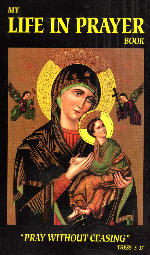
My Life In Prayer
Complete Prayer Book
CHAPLET OR BEADS OF THE SEVEN DOLORS

| HOME | SUMMA | PRAYERS | FATHERS | CLASSICS | CONTACT |
| CATHOLIC ENCYCLOPEDIA | A | B | C | D | E | F | G | H | I | J | K | L | M | N | O | P | Q | R | S | T | U | V | W | X | Y | Z |
| CATHOLIC SAINTS INDEX | A | B | C | D | E | F | G | H | I | J | K | L | M | N | O | P | Q | R | S | T | U | V | W | X | Y | Z |
| CATHOLIC DICTIONARY | A | B | C | D | E | F | G | H | I | J | K | L | M | N | O | P | Q | R | S | T | U | V | W | X | Y | Z |
 Keep Site Running
Keep Site Running

My Life In Prayer |
CHAPLET OR BEADS OF THE SEVEN DOLORS (Before reciting the Seven Dolor Beads, it is recommended that you make an Act of Contrition.) This is a devotion instituted in the course of the thirteenth century, in honor of the sorrows of the Blessed Virgin Mary, endured by her in compassion for the suffering and death of her Divine Son. It is practiced upon a Chaplet composed of seven times seven beads, each portion of seven being divided from the rest by medals, representing the seven principal sorrows of her life. In the use of it a Hail Mary has to be said on each of the beads, with one Our Father before every seven Hail Marys; and at the end of all, three Hail Marys are to be said, in honor of the sorrowful tears of our Lady. While reciting the first Our Father, and seven Hail Marys, reflect on and sympathize in the sorrow of our Blessed Lady, when she presented her Divine Child in the Temple, and heard from the aged Simeon that a sword of grief should pierce her soul on His account. Our Father, Seven Hail Marys. At the second medal, reflect on her sorrow when, to escape the cruelty of King Herod, she was forced to fly into Egypt with St. Joseph and her Divine Child. Our Father, seven Hail Marys. At the third medal, reflect on her grief when, returning from Jerusalem, she perceived that she had lost her dear Jesus, Whom she sought sorrowing during three days. Our Father, seven Hail Marys. At the fourth, reflect on her meeting her Divine Son, all bruised and mangled, carrying His cross to Calvary, and seeing Him fall under His heavy weight. Our Father, seven Hail Marys. At the fifth, reflect on her standing by when her Divine Son was lifted up on the cross, and the Blood flowed in streams from His sacred Wounds. Our Father, seven Hail Marys. At the sixth, reflect on her sorrow when her Divine Son was taken down from the cross, and she received Him into her arms. Our Father, seven Hail Marys. Seventhly, and lastly, contemplate her following His sacred Body, as it was borne by Joseph of Arimathea and Nicodemus, to the sepulchre, inclosed there, and hidden from her sight. Our Father, seven Hail Marys. Three Hail Marys, as mentioned above, in honor of her tears. INDULGENCES. Benedict XIII., September 26th, 1724, granted an Indulgence of two hundred days for every Our Father and every Hail Mary, to those who, with sincere contrition, and having confessed, or firmly purposing to confess their sins, shall recite this Chaplet on any Friday, or on any day of Lent, on the Festival of the Seven Dolors, or within the Octave; and, one hundred days on any other day of the year. Clement XII., December 12, 1734, confirmed these Indulgences, and moreover granted:— 1. A Plenary Indulgence to those who shall have recited this Chaplet for a month, every day—Confession, Communion, and prayers for the Church as usual. 2. An Indulgence of one hundred years to all who recite it on any day, having confessed their sins with sincere sorrow, or at least firmly resolving to do so. 3. One hundred and fifty years to those who recite it on Mondays, Wednesdays, and Fridays, and holydays of obligation with Confession and Communion. 4. A Plenary Indulgence one a week, on any day, to those who are accustomed to recite it four times a week, on condition of Confession, Communion, and the recital of the Chaplet on the day of Communion. 5. Two hundred years' Indulgence every time they shall hear Mass, hear a sermon, or recite an Our Father and seven Hail Marys, or perform any spiritual or corporal work of mercy to honor of our Lord, our Lady or their patron saint By a grant of His Holiness Leo XIII., (rescript of the S. C. of Indulgences,: June 8, 1898), when two or more persons recite the Rosary together, it is sufficient if one hold the Rosary and the others join with interior recollection, in prayer with the one holding the Rosary, in order to gain the same indulgences which re applicable to the souls in Purgatory
Copyright ©1999-2023 Wildfire Fellowship, Inc all rights reserved